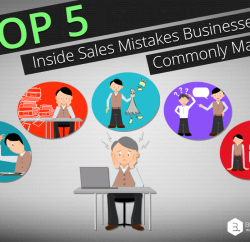A lot of other articles must have enlightened you on tips and tricks to win your business prospects and helped you close deals faster and effectively. If you’re a sales head or a manager, you might have also trained your sales team on many of these tips. But the best way to train your team with a winning strategy is to provide them with an appropriate mix of the best practices that would not only help them excel but also train them against committing silly mistakes or unproductive behaviors in the sales process.
In this blog, I am going to tell you the silly mistakes or behaviors to be avoided so that you or your sales team do not turn off your business prospects, and your winning strategy remains foolproof.
1. Avoid all instances of a Product Dump:
This is nothing, but a nervous sales rep’s attempt to fill the awkward silence which may be the most non-productive and ineffective form of one-way communication with the prospect. This can be the result of the lack of sufficient information, confidence or practice of the sales rep when he tries to put his product over and above the customer.
2. Train your sales reps to be confident but not overdo it:
The know-it-all attitude of sales rep may lead him to be over-confident and thereby, making him unproductive or inefficient. It’s easy for a rep to assume that he knows what his prospects need, after talking several times about the same product over and over again. Experience does render confidence, but assuming that you know it all, can be dangerous. Therefore, it’s wise to use past experiences to make more efficient decisions, but it’s wiser to start each time on a clean slate.
3. Sales is not about talking well:
Most sales reps believe that its all about talking well; and that’s what they believe to be the strongest skill in order to be a successful at sales. Trust me when I say, it’s not true. Actually, Sales is all about conversing well; and a good conversation is about the ability to convey as well as listen well! By just talking, all that your sales reps would do, is lose time, efforts and valuable opportunities. Let me just put it straight, no one likes a self-absorbed talker.
4. Insecure conversations can jeopardize opportunities:
Talking about competition is important, but comparison is good only when the prospect brings it up. An initial product pitch should only be about your company’s products or services or offers, and not an attempt to bring down another brand. The defensive attitude may affect the conversation adversely by deviating the prospect’s attention from the positive points of your offer to the company’s insecurities instead. So, as a substitute to take the defensive approach, take the honest one, as this will also help you to combat situations where the prospect brings up loop holes or issues in your offers, products or services. Do yourself and your sales reps’ a favor by inculcating this approach to help them build better relationships, than just sell.
5. Maintain that thin line between information and interrogation:
Gathering information from your prospects on the initial calls is work of skill and experience, and sales reps will eventually learn it. But while they haven’t yet mastered the skill, it is important to make sure that they do not turn the conversation into an awkward interrogation type. Ask questions but don’t push them to provide an answer. Understand the subtle cues if a customer is trying to avoid a question. Instead of forcing an answer out, spend the same energy in trying to gain your prospects’ trust. Remember the key is to ensure that your prospect is comfortable and feels like he/she is in control of the conversation.
6. Bonus tricks for your winning strategy:
While you absolutely make sure you or your sales reps do not commit the above mistakes, keep the following also in your best practices workbook to be a part of your sales training:
- Never arrive late for calls and appointments
- Train sales reps to keep their pockets full of available insights about the prospect, his/her business or company.
- Insights are important to determine whether a need actually exists. Do not just dial and start pitching.
- Sales reps should listen more and encourage the prospects interact with you by asking relevant questions only.
- Do not interrupt the prospect while he/she speaks.
- Update your product knowledge regularly.
In recent years, a wide variety of sales experts and influencers have proposed replacing the mantra “always be closing” with something more fitting for modern selling — “always be serving,” “always be helping,” “always be consulting,” etc. No matter what version you go with, just make sure your sales reps do their best with utmost enthusiasm.




